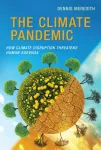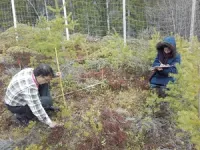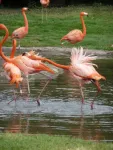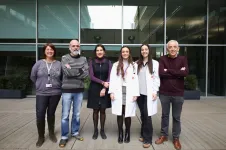(Press-News.org) A new book, The Climate Pandemic: How Climate Disruption Threatens Human Survival, concludes that humans will not survive the unrelenting onslaught of climate disruption. The e-book is available free on Amazon March 1-5.
“As horrific as the COVID-19 pandemic has been, its effects pale in comparison to the coming catastrophe from climate disruption,” wrote author and veteran science writer Dennis Meredith. “In fact, the climate pandemic will steadily worsen, even bringing our species to extinction, unless we launch a global revolution to abandon our carbon-dependent energy system.
“Given the evidence in this book, I see only a vanishingly small possibility of such a revolution. And I do not see a pathway for our species’ survival,” he wrote. “However, it is my fervent hope that those who read this book will somehow see such a pathway. I even hope that they will identify flaws in my reasoning and/or my interpretation of the science that will render my opinion invalid.
“I must emphasize that my agonizing conclusion did not arise from my own personal predilection,” Meredith wrote. “Rather, it emerged from the vast trove of credible research detailed in this book documenting the devastation to the global environment that we are causing. I do not consider myself an advocate for this conclusion, but rather its reluctant messenger.”
The most comprehensive book on climate disruption, The Climate Pandemic explores the science, technology, politics, economics, and psychology of climate disruption. It includes an extensive bibliography of references on climate disruption, with more than 1,700 hyperlinked entries. These include peer-reviewed scientific papers, books, and reports from government and international agencies and scientific associations.
“I recognize that, in the words of Carl Sagan, ‘Extraordinary claims require extraordinary evidence,’” wrote Meredith. “So, in this heavily referenced book, I have sought to document the evidence for the extraordinary claim that we face extinction. My journalistic approach has been: ‘Don’t take my word for it.’
“I hope the book and the resources it offers serve to inform researchers and policymakers about the daunting scientific, economic, and political realities of climate disruption,” wrote Meredith. “I have read so many articles and books in which the authors propose climate-rescue policies that are little more than vague, naive hand-waving, with little understanding of those realities.”
Meredith wrote that “I did have an intense debate with myself about whether to write a book that would so severely disrupt the comfortable shared fiction that humans will somehow manage to prevail in the climate pandemic.
“In the end, I decided that those who need the truth should have it. So, this book tells a hard, even devastating, truth—a really inconvenient truth, if you will.” He warned readers that “If you are not prepared to confront this truth, do not read this book.”
In writing the book, “I discovered to my surprise that much of what I believed about climate disruption were myths,” wrote Meredith. Among those myths are that current plans to limit global heating will help avoid climate catastrophe, he wrote.
For one thing, “The benchmark temperatures used in climate policymaking . . . are political numbers not scientific numbers,” wrote Meredith. “Their scientific provenance is highly dubious. The conveniently round numbers might even be considered scientifically dishonest because scientists don’t really know the consequences of each increase. But for political expediency, they pretend that they do.”
Another myth, according to the book, is that decarbonizing the global energy system—for example, increasing renewable energy or capturing carbon dioxide from power plants—will reduce or eliminate carbon pollution.
“The realistic outlook for decarbonization, however, reveals it to be a delusion borne of desperation and ignorance,” wrote Meredith.
The book’s exploration of the science of climate disruption covers underlying mechanisms of climate-driven heat waves, megadroughts, wildfires, floods, and superstorms; as well as the human impacts of climate disruption, including increased toxicity and disease, famine, migration, war, and societal collapse.
The Climate Pandemic also explains how the media, scientists, environmentalists, corporations, and politicians have failed to help mitigate climate disruption; the psychological barriers that have prevented people from acting to mitigate climate disruption; how climate “de-nihilists” have sabotaged solutions; and how climate advocates have promoted a "nostrum" of false hope.
Meredith dubs as “illusory panaceas” the Paris Agreement, renewable energy, carbon capture, geoengineering, and nuclear power.
“Some might see the dark future of climate disruption as an excuse to indulge in our most selfish, destructive impulses—continuing to plunder the Earth for our own benefit,” wrote Meredith. “However, one hopes that our better angels would prevail; that in the twilight of our species we would instead seek solace in environmental good works—in essence, palliating our planet.
“As we cycle among the stages of grief, we could give our lives meaning by offering our time, money, and effort to the organizations and causes that work toward mitigating climate disruption.”
Meredith, 76, served over his career as a public information officer at the Universities of Wisconsin and Rhode Island, MIT, Caltech, Cornell, and Duke. He is author of nonfiction books including Explaining Research: How to Reach Key Audiences to Advance Your Work (Oxford 2021), as well as science thriller novels. He also consults on research communication and conducts communication workshops for researchers. He is a Fellow of the American Association for the Advancement of Science and a member of the Society of Environmental Journalists and the National Association of Science Writers.
END
New book warns of human extinction from climate change
The most comprehensive book on climate disruption, "The Climate Pandemic" explores the science, technology, politics, economics, and psychology of climate disruption.
2023-03-01
ELSE PRESS RELEASES FROM THIS DATE:
Book tackles myths about science of menstruation
2023-03-01
CHAMPAIGN, Ill. — A new book from University of Illinois Urbana-Champaign anthropology professor Kathryn Clancy takes an unflinching look at the many ways humans have struggled – and often failed – to understand one of the greatest mysteries of human biology: menstruation.
In “Period: The Real Story of Menstruation,” Clancy first focuses on the myriad ways human societies, their leaders, scientists and health practitioners have gotten it wrong – from myths and taboos about the purpose and health effects ...
Researchers uncover how gene that increases risk of genetic heart disease works, paving way for new treatments
2023-03-01
Researchers have discovered how a gene that increases the risk of developing genetic heart disease functions, paving the way for new treatments.
The study, led by Murdoch Children’s Research Institute and published in Nature Cardiovascular Research, has revealed a new pathway for how children and adults develop cardiomyopathy, a group of diseases that affect the heart’s ability to pump blood around the body.
Heart disease is the leading cause of death worldwide. Patients with cardiomyopathy, a form of heart disease ...
Will you let a robot assist in surgery on you? The role of advertising in high-tech medical procedures
2023-03-01
Researchers from Korea Advanced Institute of Science and Technology and University of Texas at Dallas published a new Journal of Marketing article that examines whether direct-to-consumer advertising for robotics surgery is effective at swaying patients to choose it over other types of procedures.
The study, forthcoming in the Journal of Marketing, is titled “The Role of Advertising in High-Tech Medical Procedures: Evidence from Robotic Surgeries” and is authored by Tae Jung Yoon and TI Tongil Kim.
Robotic surgery and the ethics ...
Taking vitamin D could help prevent dementia, study finds
2023-03-01
Taking vitamin D supplements may help ward off dementia, according to a new, large-scale study.
Researchers at the University of Calgary’s Hotchkiss Brain Institute in Canada and the University of Exeter in the UK explored the relationship between vitamin D supplementation and dementia in more than 12,388 participants of the US National Alzheimer's Coordinating Center, who had a mean age of 71 and were dementia-free when they signed up. Of the group, 37 per cent (4,637) took vitamin D supplements.
In the study, ...
Checklist Prompters Support ICU Rounds
2023-03-01
Rounding checklists can help hospital care teams improve patient outcomes, and new research points to the potential for patient-specific checklists as a valid way to effectively translate the latest evidence into clinical practice.
These checklists can be helpful tools during daily rounds when multidisciplinary members of the patient care team convene to discuss each patient’s status and care plan. If too complex or generic, the checklists may instead become a burden, taking up valuable time with minimal impact.
One way to customize rounding checklists is to have an individual serve as a checklist prompter, listening to the conversation, eliminating ...
Home-based cardiac rehabilitation may help people live longer
2023-03-01
Research Highlights:
In a study of U.S. military veterans, researchers noted that participating in home-based cardiac rehabilitation was associated with a 36% lower risk of death compared to veterans who chose not to participate in cardiac rehabilitation.
Less than half of the study participants enrolled in rehabilitation, which focused on improving heart-healthy behaviors.
The research may be the first U.S. study to provide evidence of living longer with home-based cardiac rehabilitation in people with heart disease.
Embargoed until 4 a.m. CT/5 a.m. ET Wednesday, March 1, 2023
DALLAS, ...
Flamingos form cliques with like-minded pals
2023-03-01
Flamingos form cliques of like-minded individuals within their flocks, new research shows.
Scientists analysed the personalities and social behaviour of Caribbean and Chilean flamingos.
Birds of both species tended to spend time with others whose personality was similar to their own.
The study, by the University of Exeter and the Wildfowl & Wetlands Trust (WWT), reveals the complex nature of flamingo societies and could help in the management of captive flocks.
“Our previous research has shown that individual flamingos have particular ‘friends’ within the flock,” said Dr Paul Rose, from WWT and Exeter’s Centre for Research in Animal Behaviour.
“In ...
Social workers experienced depression, PTSD, and anxiety at alarming rates during pandemic
2023-03-01
Toronto, ON — A new study published in the journal International Social Work has uncovered concerning rates of depression, post-traumatic stress disorder (PTSD) and anxiety among social workers.
Stressors related to COVID-19 were the strongest factors associated with the negative mental health outcomes. Those who experienced a higher number of pandemic-related stressors — such as health concerns, increased caregiving responsibilities, violence in the home, family stress due to confinement, and stress associated with work-life balance — experienced mental health problems ...
Woodcocks have the brightest white feathers ever measured
2023-03-01
The mainly brown woodcock uses its bright white tail feathers to communicate in semi-darkness, reflecting 30% more light than any other known bird.
These surprise findings, by a team led by an Imperial College London scientist, suggest there is much to learn about how birds that are most active at night or at dawn and dusk communicate.
Birds that are most active during the day often have colourful plumages, which they use to communicate information with each other. Birds that are most active at dawn and dusk or at night (‘crepuscular’), such as nightjars and woodcocks, tend to have less showy plumage, as while sleeping during ...
Marker discovered which shows when a type of skin cancer is preparing to metastasise
2023-03-01
Cells that form cutaneous squamous cell carcinoma tumours prepare themselves to migrate to the lymph nodes to metastasise other organs, and they make changes so that they can survive this process. According to a study led by researchers from the Inflammatory and Neoplastic Dermatological Diseases Research Group at the Hospital del Mar Medical Research Institute, published in the journal Life Science Alliance, these cells stop consuming glucose so that they can survive by using LDL cholesterol molecules, the ...
LAST 30 PRESS RELEASES:
Novel camel antimicrobial peptides show promise against drug-resistant bacteria
Scientists discover why we know when to stop scratching an itch
A hidden reason inner ear cells die – and what it means for preventing hearing loss
Researchers discover how tuberculosis bacteria use a “stealth” mechanism to evade the immune system
New microscopy technique lets scientists see cells in unprecedented detail and color
Sometimes less is more: Scientists rethink how to pack medicine into tiny delivery capsules
Scientists build low-cost microscope to study living cells in zero gravity
The Biophysical Journal names Denis V. Titov the 2025 Paper of the Year-Early Career Investigator awardee
Scientists show how your body senses cold—and why menthol feels cool
Scientists deliver new molecule for getting DNA into cells
Study reveals insights about brain regions linked to OCD, informing potential treatments
Does ocean saltiness influence El Niño?
2026 Young Investigators: ONR celebrates new talent tackling warfighter challenges
Genetics help explain who gets the ‘telltale tingle’ from music, art and literature
Many Americans misunderstand medical aid in dying laws
Researchers publish landmark infectious disease study in ‘Science’
New NSF award supports innovative role-playing game approach to strengthening research security in academia
Kumar named to ACMA Emerging Leaders Program for 2026
AI language models could transform aquatic environmental risk assessment
New isotope tools reveal hidden pathways reshaping the global nitrogen cycle
Study reveals how antibiotic structure controls removal from water using biochar
Why chronic pain lasts longer in women: Immune cells offer clues
Toxic exposure creates epigenetic disease risk over 20 generations
More time spent on social media linked to steroid use intentions among boys and men
New study suggests a “kick it while it’s down” approach to cancer treatment could improve cure rates
Milken Institute, Ann Theodore Foundation launch new grant to support clinical trial for potential sarcoidosis treatment
New strategies boost effectiveness of CAR-NK therapy against cancer
Study: Adolescent cannabis use linked to doubling risk of psychotic and bipolar disorders
Invisible harms: drug-related deaths spike after hurricanes and tropical storms
Adolescent cannabis use and risk of psychotic, bipolar, depressive, and anxiety disorders
[Press-News.org] New book warns of human extinction from climate changeThe most comprehensive book on climate disruption, "The Climate Pandemic" explores the science, technology, politics, economics, and psychology of climate disruption.







